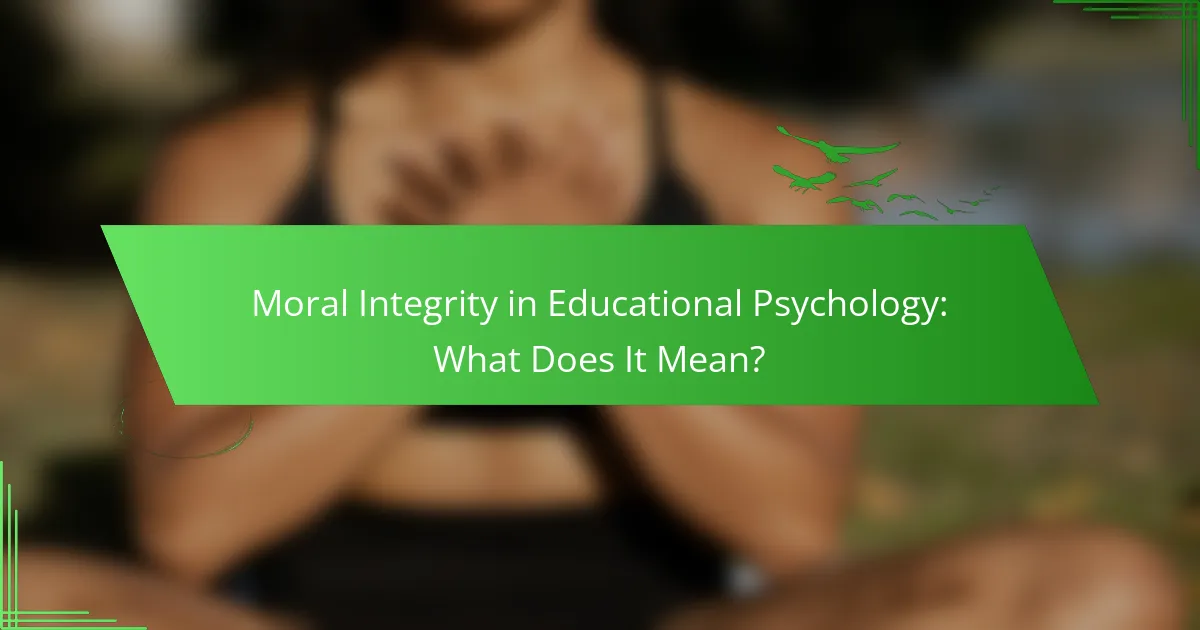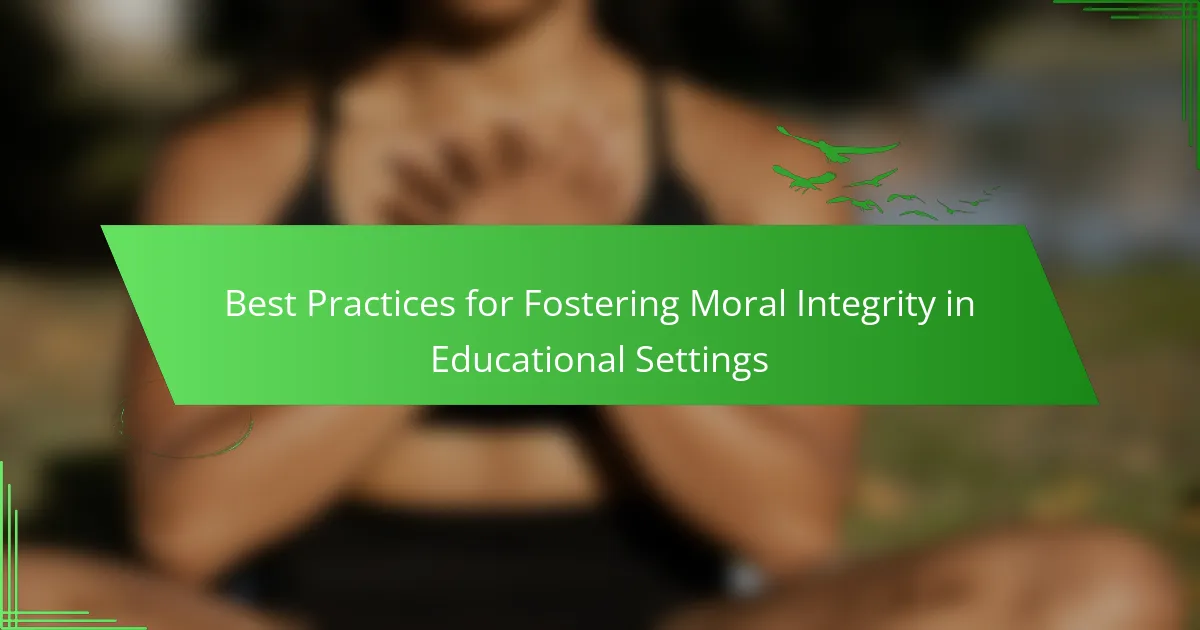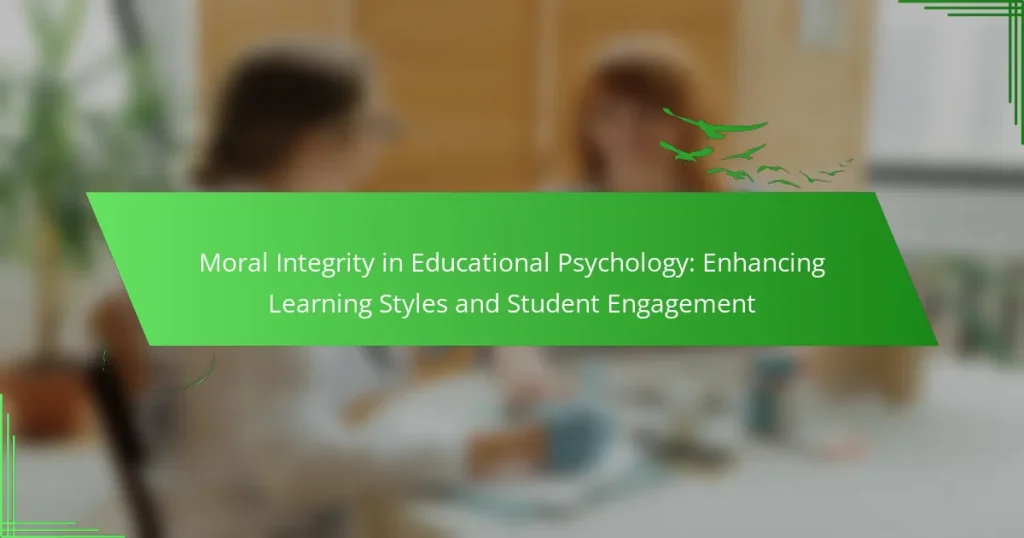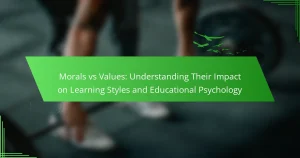Moral integrity in educational psychology significantly enhances student engagement and learning outcomes. It fosters adaptability, motivation, and inclusivity in diverse learning environments. Upholding ethical principles builds trust and accountability among students and educators. Implementing values-based education and engaging in real-world projects further deepens students’ understanding of moral integrity.

Moral Integrity in Educational Psychology: What Does It Mean?
Moral integrity in educational psychology refers to the commitment to ethical principles that enhance learning and student engagement. It involves fostering a culture of honesty, respect, and responsibility in educational settings. This integrity supports diverse learning styles by promoting trust and open communication between educators and students. As a result, students feel valued and motivated, leading to improved academic outcomes. Research shows that environments characterized by moral integrity can significantly boost student engagement and retention rates.
How Does Moral Integrity Influence Learning Styles?
Moral integrity significantly enhances learning styles by fostering trust and engagement in educational settings. Students with strong moral principles are more likely to embrace collaborative learning, leading to improved academic outcomes. Research shows that integrity promotes a positive classroom environment, encouraging open communication and respect among peers. This supportive atmosphere helps cater to diverse learning styles, allowing for personalized educational experiences. Ultimately, moral integrity serves as a foundation for effective learning, enhancing both student engagement and academic performance.
What Are the Key Components of Moral Integrity in Education?
Moral integrity in education encompasses honesty, fairness, respect, and responsibility. These components foster a positive learning environment and enhance student engagement. Honesty ensures transparency in communication and assessment. Fairness promotes equal opportunities for all students. Respect nurtures a culture of inclusion and support. Responsibility encourages students to take ownership of their learning. Together, these elements create a foundation for ethical behavior and decision-making in educational settings.
How Do Educators Demonstrate Moral Integrity?
Educators demonstrate moral integrity by modeling ethical behavior, fostering a respectful environment, and prioritizing student welfare. They establish trust through transparency and accountability. For example, by addressing conflicts fairly, they promote ethical decision-making. This approach enhances student engagement and learning styles by creating a supportive atmosphere.
What Role Does Ethical Decision-Making Play?
Ethical decision-making is crucial in educational psychology as it fosters moral integrity, enhancing learning styles and student engagement. It guides educators in making choices that respect students’ rights and promote an inclusive environment. Ethical frameworks help in addressing conflicts and ensuring fairness, which ultimately leads to improved educational outcomes. Research indicates that when educators prioritize ethics, student motivation and participation increase, creating a more effective learning atmosphere.
Why Is Student Engagement Critical in Educational Psychology?
Student engagement is critical in educational psychology because it directly influences learning outcomes and retention. Engaged students demonstrate higher motivation, improved academic performance, and greater satisfaction with their educational experience. Research indicates that active participation enhances cognitive processes, leading to deeper understanding and application of knowledge. Furthermore, fostering moral integrity within educational environments promotes ethical decision-making, which can positively affect student engagement. By aligning teaching methods with diverse learning styles, educators can create inclusive environments that enhance student involvement, ultimately supporting their academic and personal growth.

Universal Attributes of Learning Styles: What Are They?
Moral integrity in educational psychology enhances learning styles and student engagement through universal attributes. These attributes include adaptability, motivation, and inclusivity, which foster a supportive learning environment. Adaptability allows educators to tailor approaches to diverse learning styles, improving comprehension. Motivation drives student engagement, encouraging active participation. Inclusivity ensures all students feel valued, enhancing collaboration and peer interaction. Together, these attributes create a holistic educational experience that promotes moral integrity and effective learning.
How Do Different Learning Styles Impact Student Engagement?
Different learning styles significantly enhance student engagement by catering to individual preferences. Visual learners thrive with diagrams and videos, while auditory learners benefit from discussions and lectures. Kinesthetic learners engage through hands-on activities, promoting active participation. Tailoring teaching methods to these diverse styles fosters a more inclusive environment, increasing motivation and retention. Research indicates that when students connect with their preferred learning style, their engagement levels rise, leading to improved academic outcomes.
What Are the Most Common Learning Styles in Education?
The most common learning styles in education include visual, auditory, and kinesthetic. Understanding these styles enhances moral integrity by fostering student engagement and tailoring teaching methods to individual needs. Visual learners benefit from diagrams and charts, auditory learners thrive on discussions and lectures, while kinesthetic learners excel through hands-on activities. Adapting to these styles promotes a more inclusive educational environment.
How Do Visual Learners Absorb Information?
Visual learners absorb information through visual aids such as diagrams, charts, and videos. These tools enhance comprehension and retention by providing clear representations of concepts. Research indicates that visual aids can improve learning outcomes significantly, often leading to higher engagement levels in educational settings. By aligning teaching methods with visual learning preferences, educators can foster a more effective learning environment.
What Techniques Benefit Auditory Learners?
Auditory learners benefit from techniques that engage their listening skills and enhance retention. Effective methods include using verbal instructions, incorporating discussions, and utilizing audio materials.
Verbal instructions help auditory learners grasp concepts through spoken words, making complex ideas more accessible. Group discussions encourage interaction and allow students to articulate their thoughts, reinforcing understanding. Audio materials, such as podcasts and recorded lectures, provide diverse content formats that cater to auditory preferences.
Incorporating rhythm and music can also enhance memory retention for auditory learners. Techniques like mnemonic devices that utilize sound can create stronger associations with the material.
Overall, these strategies align with the unique attributes of auditory learning styles, fostering deeper engagement and comprehension in educational settings.
How Can Kinesthetic Learners Excel?
Kinesthetic learners excel by engaging in hands-on activities, which enhance their understanding and retention of information. They benefit from physical movement, allowing them to connect concepts to real-world applications. Techniques such as role-playing, building models, and using simulations can significantly improve their learning experience. Incorporating these methods fosters greater student engagement and moral integrity within educational psychology.

Unique Attributes of Moral Integrity: How Can They Be Applied?
Moral integrity enhances educational psychology by fostering trust and accountability in learning environments. Unique attributes include honesty, consistency, and ethical decision-making. These qualities can be applied to improve student engagement through collaborative projects that emphasize shared values. As a result, students develop a deeper understanding of moral principles and their importance in academic settings.
What Strategies Promote Moral Integrity Among Educators?
Strategies that promote moral integrity among educators include fostering open communication, modeling ethical behavior, and encouraging reflective practices. These approaches enhance trust and respect in educational environments.
Open communication allows educators to express values and expectations clearly, creating a culture of honesty. Modeling ethical behavior demonstrates integrity in action, influencing students and colleagues alike. Encouraging reflective practices enables educators to assess their decisions and actions critically, reinforcing their commitment to moral standards.
Incorporating these strategies not only supports individual growth but also enhances overall student engagement and learning styles. As a result, moral integrity becomes a shared value within the educational community.
How Can Moral Integrity Enhance Collaborative Learning?
Moral integrity significantly enhances collaborative learning by fostering trust among students. Trust encourages open communication, leading to deeper engagement and shared learning experiences. When students exhibit moral integrity, they contribute to a positive learning environment, which boosts motivation and collaboration. Research shows that groups with high moral integrity perform better academically due to increased accountability and mutual respect. This creates a cycle where integrity leads to better collaboration, which in turn reinforces moral values.

Rare Attributes: What Are the Challenges in Upholding Moral Integrity?
Upholding moral integrity in educational psychology faces challenges like conflicting values, institutional pressures, and diverse student needs. These factors can hinder the effective implementation of ethical practices. For instance, educators may struggle to balance personal beliefs with institutional expectations, leading to moral dilemmas. Additionally, varying learning styles require tailored approaches, complicating the adherence to a unified ethical standard. Ultimately, maintaining moral integrity necessitates ongoing reflection and adaptation to foster a supportive learning environment.
What Ethical Dilemmas Do Educators Face?
Educators face numerous ethical dilemmas that challenge their moral integrity. Key dilemmas include balancing student needs with institutional policies, addressing diversity and inclusion, and maintaining confidentiality while fostering engagement.
One significant aspect is the conflict between standardized testing and individualized learning styles. Educators often struggle to support diverse learners while adhering to rigid assessment frameworks. Additionally, the pressure to meet performance metrics can compromise the quality of education and student engagement.
Another ethical concern arises from the responsibility to advocate for students while navigating potential biases. Educators must ensure equitable treatment, which can be challenging in environments with systemic inequalities.
Lastly, the emotional well-being of students is paramount. Educators must balance their professional responsibilities with the need to support students’ mental health, often requiring difficult decisions that impact learning outcomes.
How Can Schools Address Issues of Academic Dishonesty?
Schools can address issues of academic dishonesty by fostering an environment of moral integrity. Implementing educational programs that emphasize ethical behavior enhances student engagement and learning styles.
Encouraging open discussions about the consequences of dishonesty helps students understand its impact on their academic journey. Additionally, integrating technology can provide tools for promoting academic honesty, such as plagiarism detection software.
Providing clear guidelines and consequences for dishonest behavior establishes accountability. Lastly, involving parents in discussions about integrity reinforces values outside the classroom, creating a holistic approach to ethical education.

Best Practices for Fostering Moral Integrity in Educational Settings
Moral integrity in educational settings enhances student engagement and learning styles. Fostering an environment that prioritizes ethical behavior can lead to improved academic outcomes. Educators should model integrity, encourage open discussions about ethical dilemmas, and create a curriculum that integrates moral reasoning.
Implementing values-based education promotes critical thinking and empathy among students. Research indicates that students exposed to moral integrity frameworks demonstrate higher levels of engagement and collaboration. Schools that actively promote integrity report increased trust and respect within the community, benefiting both students and educators.
Engaging students in service-learning projects can deepen their understanding of moral integrity. These projects allow students to apply ethical principles in real-world contexts, enhancing their learning experience. Furthermore, peer-led discussions on integrity can empower students, fostering a culture of accountability and ethical reflection.
Regular assessments of the school’s climate regarding moral integrity can provide valuable insights. Gathering feedback from students, parents, and staff can identify areas for improvement and highlight successful initiatives. This continuous evaluation supports a dynamic approach to fostering moral integrity in education.
What Techniques Can Enhance Student Engagement Through Moral Integrity?
Incorporating moral integrity enhances student engagement by fostering a sense of responsibility and ethical behavior. Techniques include promoting open discussions on ethical dilemmas, integrating character education into the curriculum, and modeling integrity through teacher behavior. These approaches create a supportive learning environment that encourages students to reflect on their values and actions. As a result, students become more engaged and motivated to participate in their education.
How Can Educators Create an Environment of Trust and Respect?
Educators can create an environment of trust and respect by modeling moral integrity and fostering open communication. Establishing clear expectations encourages students to engage confidently. Active listening and acknowledging diverse perspectives enhance respect. Regular feedback reinforces trust and promotes a positive learning atmosphere.
What Common Mistakes Should Educators Avoid in Promoting Integrity?
Educators should avoid promoting integrity through vague policies, lack of modeling, inconsistent enforcement, and insufficient communication. These mistakes undermine trust and hinder student engagement. Clear expectations and active demonstration of integrity are essential for fostering a moral learning environment.
What Expert Insights Can Guide Moral Integrity in Education?
Expert insights emphasize the importance of moral integrity in education to enhance learning styles and student engagement. Educators should model ethical behavior, fostering a culture of trust and respect. This approach strengthens student-teacher relationships and encourages active participation. Research indicates that students who perceive their educators as morally upright exhibit higher engagement levels and improved academic outcomes. Implementing character education programs further supports this integrity, promoting values such as honesty and responsibility, which are crucial for holistic development.




